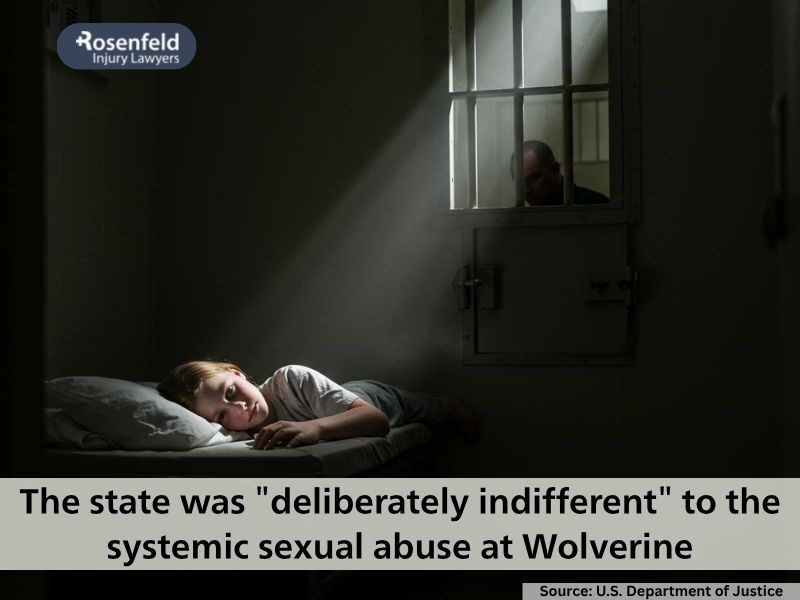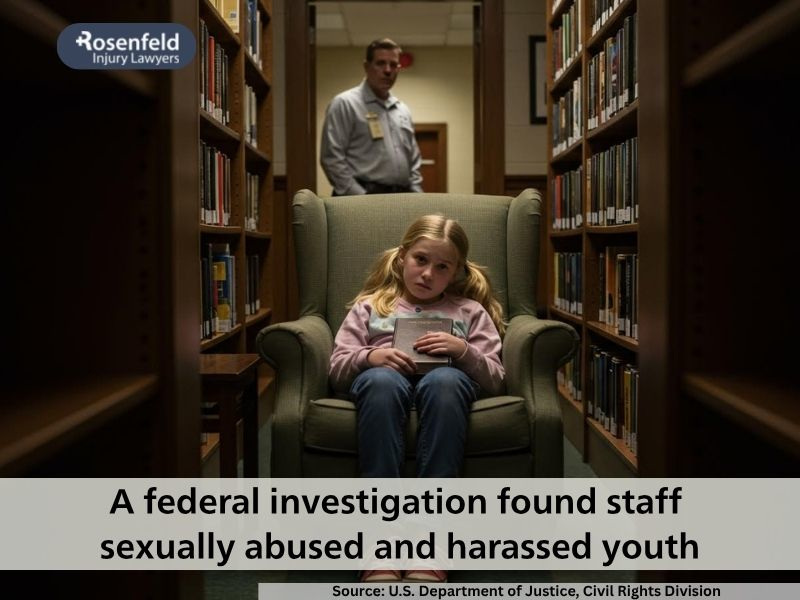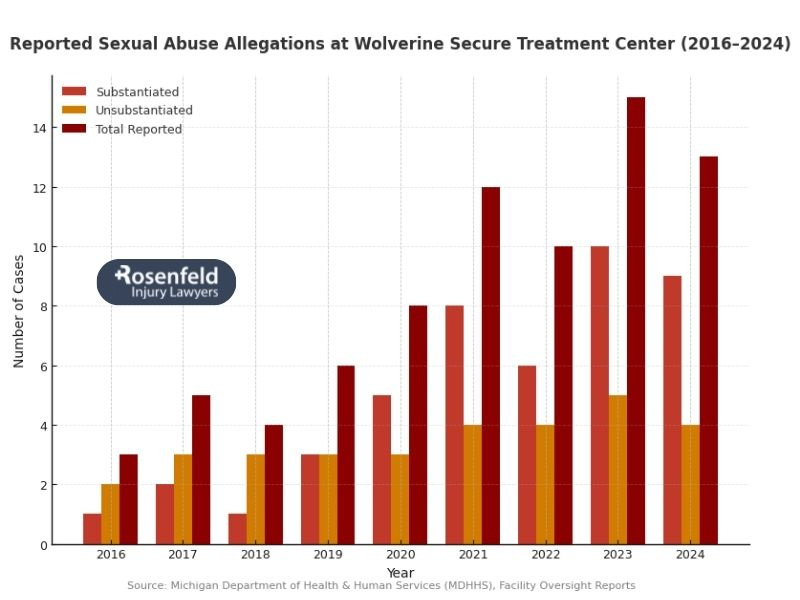Wolverine Secure Treatment Center Sexual Abuse
Financial Compensation for Survivors of Sexual Abuse at Maryland Juvenile Detention Centers

Wolverine Secure Treatment Center sexual abuse cases have raised serious concerns about the safety of vulnerable youths placed in state-run facilities. Families who trusted this center in Michigan to provide care instead learned that abuse occurred behind closed doors.
At Injury Lawyer Team, we stand with survivors and their loved ones, fighting to hold negligent institutions accountable. Our experienced sexual abuse attorneys in Michigan understand the lasting trauma caused when juveniles are abused by staff in a juvenile detention center, and we are committed to pursuing justice through civil lawsuit representation.
Sex Abuse Allegations Against the Wolverine Secure Treatment Center in Michigan
The Wolverine Secure Treatment Center (WSTC) was located in Buena Vista Township, Saginaw County, Michigan. It was owned and operated by Wolverine Human Services, a private company that has managed multiple juvenile detention facilities across the state.
Although licensed by the State of Michigan, Wolverine Human Services was directly responsible for hiring staff members, supervising employees, and ensuring proper treatment of detained youth.
WSTC opened in 1997 as the first privately run secure treatment center in Michigan for male juvenile inmates between the ages of 12 and 21. The facility housed up to 80 youths in a prison-like compound with a 16-foot security fence, locked dormitories, and strict supervision.
Officially, its mission was rehabilitation, offering counseling, psychiatric services, education, and addiction treatment. But according to survivors, what was promised as care quickly devolved into a pattern of abuse, neglect, and unsafe conditions.
By 2020, repeated reports of misconduct at WSTC drew the attention of state regulators. In January 2021, a particularly alarming incident surfaced involving unsafe and unauthorized restraint techniques on a juvenile resident.
Surveillance video captured staff members pinning down a child in violation of Therapeutic Crisis Intervention standards, causing broken blood vessels, visible bruising, and swelling. Despite the injuries, medical care was delayed, and the incident was treated as insignificant by staff. That same day, another resident was subjected to improper restraints, again leading to head trauma and pain.
These events highlighted a culture of indifference within the center. Reports show that staff ignored complaints, failed to follow mandatory reporting laws, and refused to notify Child Protective Services even when harm was evident. For many, this was clear evidence that systemic negligence was ingrained in the operation of the secure treatment facility.
In February 2021, Michigan downgraded the facility’s license to provisional status, citing serious violations. Ultimately, the state revoked the license entirely, forcing the Wolverine Secure Treatment Center to shut down later that year. Officials acknowledged that abuse occurred regularly and that leadership ignored years of warnings, leaving countless youths vulnerable.
Among the most serious claims are those involving sexual abuse. In January 2023, prosecutors announced that Sativa A. Bryant, then 19 years old, pleaded guilty to fourth-degree criminal sexual conduct for sexually assaulting a 13-year-old girl at the center in Michigan. Prosecutors alleged that multiple sex acts took place between Bryant and the underage victim while both were housed at the facility.
This case was not an isolated event. Survivors and advocates argue that the very design and management of the facility created an environment where sexual abuse could thrive. With insufficient screening of staff members, inadequate training, and failures to investigate complaints, children were left dangerously exposed to predators. Some youths were sexually abused by staff entrusted with their care, an unconscionable betrayal of duty.

What Laws Govern Sexual Abuse Lawsuits Against the Wolverine Secure Treatment Center?
Survivors of abuse at the Wolverine Secure Treatment Center may pursue justice under several provisions of Michigan law that govern institutional responsibility, civil liability, and protections for minors. While criminal cases punish individual offenders, civil lawsuits allow victims to seek compensation for the harm caused when abuse occurred in a detention or treatment center.
Entities such as juvenile detention facilities and treatment centers can be held civilly liable when their negligence or gross negligence results in harm to children in their custody. Under MCL 691.1407(2), governmental immunity does not shield employees or entities when conduct amounts to gross negligence, defined as “conduct so reckless as to demonstrate a substantial lack of concern for whether an injury results.”
Michigan recognizes civil claims for negligent hiring, retention, and supervision. Courts have consistently held that institutions may be liable if they hire or retain staff members who pose a danger to minors, or if they fail to act on credible warnings of misconduct (as was done in Hersh v. Kentfield Builders, Inc., 385 Mich 410 (1971)).
Michigan law explicitly requires mandatory reporting of suspected child abuse. Under MCL 722.623, staff members at juvenile detention centers and treatment centers are “mandated reporters” who must immediately report suspected sexual abuse to the Department of Health and Human Services or law enforcement.
How Long Do Victims Have to File a Civil Lawsuit?
How much time victims have to take legal action is governed by the sexual abuse statute of limitations in Michigan. The rules are complex because they differ depending on the survivor’s age at the time of the abuse, the type of claim filed, and whether the lawsuit is brought against an individual or an institution.
Under MCL 600.5851b, survivors of child sexual abuse in Michigan have until their 28th birthday, or three years from the date of discovery (whichever is later), to file a civil lawsuit against the individual perpetrator. The discovery rule allows survivors to file even years later if they only recently connected their trauma to the abuse.
When survivors pursue claims against institutions, the time limits can be different. These claims may be subject to the same age 28 or three-year discovery rule, but courts closely evaluate how the claim is framed and whether the conduct falls under broader negligence standards.
Michigan lawmakers recently expanded survivors’ rights in response to widespread sex abuse scandals. The 2023 legislative reforms (effective March 2024) extended the statute of limitations for sexual assault lawsuits to age 52 for survivors of childhood sexual assault. There is also a two-year revival window for certain previously time-barred claims, allowing victims to refile civil lawsuits.
How Much Can Sexual Abuse Victims Recover in Michigan?
The value of a civil lawsuit for sexual abuse in Michigan varies widely depending on the facts of the case, the extent of the harm, and whether an institution like the Wolverine Secure Treatment Center is held liable.
Recoveries range from $105,000 on the low end to more than $15,400,000 in the most severe cases. The median award is about $1,250,000, while the average recovery is approximately $2,967,480. These numbers reflect both settlements and verdicts in intentional tort–sexual assault claims across the state. Survivors may recover damages for:
- Medical and therapy costs (past and future)
- Emotional distress and psychological trauma
- Pain and suffering
- Loss of quality of life
- Punitive damages in cases of gross negligence or institutional misconduct

Who Can Be Held Liable in Sexual Abuse Lawsuits?
Liability in Michigan juvenile detention center sexual abuse lawsuits is not limited to the individual abuser. Survivors of abuse at facilities like the Wolverine Secure Treatment Center may also bring claims against the institution itself and its parent operator, Wolverine Human Services.
Institutions can be held responsible for negligent hiring, negligent supervision, failure to train staff members, or ignoring mandatory reporting duties. In some cases, state or local agencies that licensed or oversaw the detention center may also face claims if gross negligence contributed to the harm.
How Injury Lawyer Team Can Help
Sexual abuse cases involving institutions like the Wolverine Secure Treatment Center are complex. Survivors often face challenges such as proving institutional negligence, navigating Michigan law, and standing up against well-funded organizations and insurers.
At Injury Lawyer Team, we have the experience and resources to handle these cases with the sensitivity and determination they require. Our youth detention center sexual abuse lawyers investigate thoroughly, work with experts, and build strong claims to hold both perpetrators and negligent institutions accountable.
Our sexual abuse and assault law firm represents survivors on a contingency fee basis, which means you pay nothing unless we win compensation for you. Contact us for a free consultation today!
All content undergoes thorough legal review by experienced attorneys, including Jonathan Rosenfeld. With 25 years of experience in personal injury law and over 100 years of combined legal expertise within our team, we ensure that every article is legally accurate, compliant, and reflects current legal standards.








